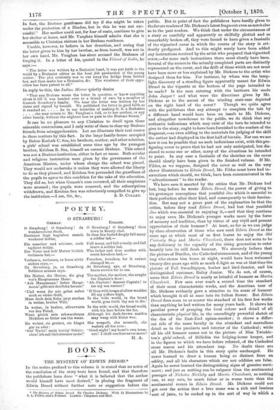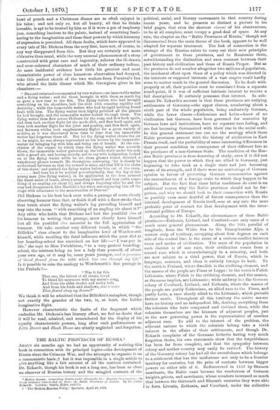BOOKS.
THE MYSTERY OF EDWIN DROOD.* Ii the notice prefixed to this volume it is stated that no notes of the conclusion of the story have been found, and that therefore the publishers have done " what it is believed that the author would himself have most desired," in placing the fragment of Edwin Drood without further note or suggestion before the
The Mystery of Edwin Drood. By Charles Dickens. With 12 Illustrations by S. L. Elides, and a Portrait. London : Chapman and Hall.
public. But in point of fact the publishers have hardly given to thefuture readers of Mr. Dickens's latest fragment even as much clue as to the past readers. We think that under the circumstances of a story so carefully and apparently so skilfully plotted and so remarkably broken off, they were bound to have given a facsimile of the vignetted cover in which the course of the story is evi- dently prefigured. And to this might surely have been added any instructions received by the artist who prepared that vignetted cover,—for some such instructions there must clearly have been. Several of the scenes in the actually completed parts are distinctly represented on the cover, and the drift of those which are not must have been more or less explained by Mr. Dickens to the artist who designed them for him. For instance, by whom was the lamp- light discovery of a standing figure apparently meant for Edwin Drood in the vignette at the bottom of the page intended to be made? Is the man entering with the lanthorn his uncle John Jasper? and what were the directions given by Mr. Dickens as to the ascent of the winding stair-case depicted
on the right hand of the cover? Though we quite agree with the publishers that any attempt to complete the tale by a different hand would have been an insult to Mr. Dickens, and altogether unwelcome to the public, we do think that any authentic indications which may exist of the turn he intended to give to the story, ought to have been furnished to the readers of the fragment,—as even adding to the materials for judging of the skill the author had displayed in the first half of his tale. Nor can we see how it can be possible that no such indications exist, with this pre- figuring cover to prove that he had not only anticipated, but dis- closed to some one or other, many of the situations he intended to paint. In any case a facsimile of the sketches on the cover should clearly have been given in the finished volume. If Mr. Fildes, as we suppose, designed the cover as well as the very clever illustrations to Edwin Drood, Mr. Fildes must have had in- structions which should, we think, have been communicated in the " advertisement " to the reader.
We have seen it asserted by the critics that Mr. Dickens had lost, long before he wrote Edwin Drood, the power of giving to his grotesque conceptions that youthful elan which is essential to their perfection after their kind, and consequently to their fascina- tion. But may not a great part of the explanation be that the critics, before they read Edwin Drood, had lost that youthful élan which was essential to enjoying it,—and that they continue to enjoy even Mr. Dickens's younger works more by the force of memory and tradition, than by virtue of any vivid and present appreciation of their humour? At least, so far as we can judge by close observation of those who now read Edwin Drood at the same age at which most of us first learnt to enjoy the Old Curiosity Shop and _4fartin Chuzzlewit, there does not seem to be any deficiency in the capacity of the rising generation to enter heartily into its still fresh humour. We sincerely believe that the picture of Durdles, the Cathedral stonemason, and of the young imp who stones him home at night, would have been welcomed twenty-five years ago with as much delight as was at that time the picture of Poll Sweedlepipes, barber and bird-fancier, and his distinguished customer, Bailey Junior. We do not, of course, mean that Edwin Drood is nearly as brimful of humour as Martin Chuzzlewit. Few men ever reach a second time the standard of their most characteristic works, and the American tour of Mr. Dickens evidently gave a stimulus to his sense of humour which brought it all at once into its fullest flower. But Edwin Drood does seem to us nearer the standard of his first few works than anything he had written for many years back. It shows his peculiar power of grasping the local colour and detail of all characteristic physical life, in the exceedingly powerful sketch of the den of the East-End opium-smoker ; it shows a differ- ent side of the same faculty in the abundant and marvellous detail as to the precincts and interior of the Cathedral ; while all his old humour comes out in the picture of Miss Twinkle- ton's girls'-school, of Billickin the lodging-house keeper, and in the figures to which we have before referred, of the Cathedral atone mason and his attendant imp. No doubt there are all Mr. Dickens's faults in this story quite unchanged. He never learned to draw a human being as distinct from an oddity, and all his characters which are not oddities are false. Again he never learned the distinguishing signs of genuine senti- ment; and just as nothing can be vulgarer than the sentimental passages of Nicholas Nickleby and Martin Chuzzlewit, so nothing can, at any rate, be much falser or in worse taste than the sentimental scenes in Edwin Drood. Mr. Dickens could not get over the notion that a love scene was a rich and luscious sort of juice, to be sucked up in the sort of way in which a
bowl of punch and a Christmas dinner are so ofteit enjoyed in his tales ; and not only so, but all beauty, all that he thinks loveable, is apt to be treated by him as if it were a pot of raspberry jam, something luscious to the palate, instead of something fasci- nating to the imagination and those finer powers by which harmony of expression is perceived. All these faults, which have appeared in every tale of Mr. Dickens from the very first, have not, of course, in any way disappeared from this. But they are certainly not more obtrusive than usual, while the very unusual phenomenon• of a story constructed with great care and ingenuity, relieves the ill-drawn and over-coloured characters of much of their ordinary tedium. As mere incidental evidence how little his greatest and most characteristic power of close humorous observation had decayed, take this perfect sketch of the two waiters from Furnival's Inn who attend the little dinner which Mr. Grewgious gives in his chambers:—
" Buzzard returned accompanied by two waiters—an immovable waiter and a flying waiter ; and the three brought in with them as much fog as gave a new roar to the fire. The flying waiter, who had brought everything on his shoulders, laid the dal with amazing rapidity and dexterity ; while the immovable waiter, who had brought nothing, found fault with him. The flying waiter then highly polished all the glasses he had brought, and the immovable waiter looked through them. The flying waiter then flew across Holborn for the soup, and flew back again, and then took another flight for the made-dish, and flew back again, and then took another flight for the joint and poultry, and flew back again, and between whiles took supplementary flights for a great variety of articles, as it was discovered from time to time that the immovable waiter had forgotten them all. But let the flying waiter cleave the air as he might, ho was always reproached on his return by the immovable waiter for bringing fog with him and being out of breath. At the con- clusion of the repast, by which time the flying waiter was severely blown, the immovable waiter gathered up the table-cloth under his arm with a grand air, and having sternly, not to say with indignation, looked on at the flying waiter while he set clean glasses round, directed a valedictory glance towards Mr. Grewgious, convoying, let it clearly bo understood between us that the reward is mine, and that Nil is the claim of this slave,' and pushed the flying waiter before him out of the room.
And here let it be noticed parenthetically, that the leg of this young man [the flying waiter], in its application to the door, evinced the finest sense of touch, always preceding himself and tray (with some- thing of an angling air about it), and always lingering after he and the tray had disappeared, like Macbeth's leg when accompanying him off the stage with reluctance to the assassination of Duncan."
Did Dickens in his best book ever write a passage of more closely observing humour than that, or finish it off with a finer stroke than that touch about the flying waiter's leg preceding himself and tray into the room " with something of an angling air about it ?" Any critic who holds that Dickens had lost the youthful élan of his humour in writing that passage, must clearly have himself lost all the youthful élan essential to the full appreciation of humour. Or take another very different touch, in which " the Billickin " rises almost to the imaginative level of Wordsworth himself, while recalling the fatal influence which the poor diet at her boarding-school has exercised on her life :—" I was put in life," she says to Miss Twiukleton, " to a very genteel boarding- school, the mistress being no less a lady than yourself, of about your own age, or it may be, some years younger, and a poorness of blood flowed front the table which has run through my life." Is it possible to miss the analogy to 1Vordsworth's fine passage in the Prelude ?—
" Was it for this That one, the fairest of all rivers, loved To blend his murmurs with my nurse's song, And from his alder shades and rocky falls And from his fords and shallows, seat a voice That flowed along my dreams?"
We think it will be admitted that the Billickin's metaphor, though not exactly the grander of the two, is, at least, the bolder imaginative flight.
However characteristic the faults of the fragment which embodies Mr. Dickens's last literary effort, we feel no doubt that it will be read, admired, and remembered for the display of his equally characteristic powers, long after such performances as
Little Dorrit and Bleak House are utterly neglected and forgotten.































 Previous page
Previous page